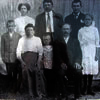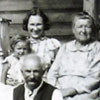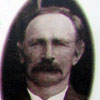August Posti
 August Posti followed in the footsteps of many of his fellow Estonians by immigrating to Canada in the first few years of the 20th century. Accompanying August was his wife, Miili (Emillie), and their two small children, Hugo and Anna. August desperately wanted to escape the unjust economic conditions present in Estonia. The open prairies of Canada seemed like a favourable opportunity. The Posti family travelled to Riga, Latvia then to Liverpool and eventually arrived in Halifax, Nova Scotia. They travelled by train to Red Deer where they were greeted by members of the Kingsep, Kask and Walters family.
August Posti followed in the footsteps of many of his fellow Estonians by immigrating to Canada in the first few years of the 20th century. Accompanying August was his wife, Miili (Emillie), and their two small children, Hugo and Anna. August desperately wanted to escape the unjust economic conditions present in Estonia. The open prairies of Canada seemed like a favourable opportunity. The Posti family travelled to Riga, Latvia then to Liverpool and eventually arrived in Halifax, Nova Scotia. They travelled by train to Red Deer where they were greeted by members of the Kingsep, Kask and Walters family.
 August soon found an agreeable piece of land adjacent to the Medicine River. The surrounding spruce trees were used to build a sturdy log house. A small garden of turnips, carrots, potatoes, beets and cabbage was planted. August worked for the Canadian Pacific Railway during the winter months while Emillie tended to the livestock. She also spun wool to knit mittens and stockings. Money from the sale of churned butter was used to purchase salt, flour and dried fruit. August cleared additional land when possible, increasing space for the planting of rye, barley, oats and flax fields.
August soon found an agreeable piece of land adjacent to the Medicine River. The surrounding spruce trees were used to build a sturdy log house. A small garden of turnips, carrots, potatoes, beets and cabbage was planted. August worked for the Canadian Pacific Railway during the winter months while Emillie tended to the livestock. She also spun wool to knit mittens and stockings. Money from the sale of churned butter was used to purchase salt, flour and dried fruit. August cleared additional land when possible, increasing space for the planting of rye, barley, oats and flax fields.
 The Posti family increased to four boys and two girls: Hugo, Anna, Olga, Karl, Henry, and Rudolph. All of the children were responsible for learning household chores and farming tasks. They were careful observers of the natural environment around them, often sharing stories about the life cycles of organisms living in their pond. August was a firm believer in community endeavors. He believed that any enterprise completed cooperatively garnered a minimal output from each individual while yielding the greatest good to the greatest number of people. This was exemplified by the completion of the Estonian school. A community project, the school was constructed by a number of different people and established an educational facility for all children living in the vicinity.
The Posti family increased to four boys and two girls: Hugo, Anna, Olga, Karl, Henry, and Rudolph. All of the children were responsible for learning household chores and farming tasks. They were careful observers of the natural environment around them, often sharing stories about the life cycles of organisms living in their pond. August was a firm believer in community endeavors. He believed that any enterprise completed cooperatively garnered a minimal output from each individual while yielding the greatest good to the greatest number of people. This was exemplified by the completion of the Estonian school. A community project, the school was constructed by a number of different people and established an educational facility for all children living in the vicinity.
 August Posti enjoyed entertaining guests at his home. Deliberations were often held in the Posti living room and attempted to resolve various agricultural issues. August passed away in 1943 and Emillie in 1945. They are buried in the Gilby Cemetery.
August Posti enjoyed entertaining guests at his home. Deliberations were often held in the Posti living room and attempted to resolve various agricultural issues. August passed away in 1943 and Emillie in 1945. They are buried in the Gilby Cemetery.








